Very Specific Types Of Physicists
very specific types of physicists
emeritus: a well-meaning retired professor who still frequents the department. occasionally seen jogging up and down the halls of the lab. it’s how he gets his daily exercise. his field of research is obsolete and he spends most of his days making art based on physics equations. asks all of the female undergrads if they plan to teach high school physics.
star child: no one will measure up to this alumnus. they started research in high school, graduated from undergrad a year early with a few papers already under their belt, and finished their phd (at a very prestigious university) in two years. they visit occasionally to present their research and talk to the undergrad physics students. very down to earth and kind. undergrads, grad students, and professors alike are in awe.
father figure: this prof’s lectures are full of dad jokes, metaphors comparing the behaviors of particles with sugared-up three-year-olds, and digressions about something that’s more fun to talk about than the subject matter. says “i’m not angry, just disappointed” when the class does poorly on an exam. when you go to his office hours there is almost always a child or two underneath his desk or drawing on his whiteboard (the bottom third of which is always covered in stick figures and scribbles). intensely watched the construction from his office window as a new laboratory was being built.
academic rival: you were friends over the summer when you were both doing research but they became distant. small talk always turns into bickering about the importance of your respective research when you run into each other getting coffee in the common room. begrudgingly you admit to yourself, they’re really good at what they do. thank god you don’t belong to the same research group.
harsh but kind: brilliant researcher with high expectations of their students. will offer and make you tea as they grade your problem sets (with commentary) in front of you. after your semester in their class, you buy a bag of loose-leaf jasmine green tea because they got you hooked on it.
the politician: buddies with some higher-ups in university admin and the heads of other colleges. your peers derail class by bringing up current events. has a fixation on swords and genealogy. a bit of an anglophile. you took apart a transistor radio with them once. will make formal complaints to the math department on your behalf.
melancholy teaching professor: very cynical from a career in academia but here to have fun. one of the friendliest faces in the department. organizes the students and faculty to do outreach and lugs physics demos all around the tri-county area. talks to the undergrads like they are people. always kind of sad, it makes you wish you could fix all of the ills of academia for them.
More Posts from Purpletelescope and Others

Jellyfish Sprite
Red sprites or the tentacle-like spurts of red lightning in the sky during a storm are sometimes referred to as Jellyfish Sprite (because of their shape). There are also some that are vertical columns of red light and those are called carrot sprites.
They are ultra fast electricity traveling through the atmosphere towards space and are extremely rare (they last a tenth of a second). They can also be seen from space.
The picture above was captured on Mt. Locke in Texas (July 2nd, 2020) by Stephen Hummel.


👏🏾Education 👏🏾is 👏🏾a 👏🏾right,👏🏾 not👏🏾 a👏🏾 service 👏🏾
Pass along and use the shit out of them
spring journal prompts
things to get rid of, things to gain
something you want to learn
go out and press some spring flowers, write how each makes you feel
write what each colour of the rainbow means to you
what does birdsong make you think of?
do some mental spring cleaning; dump old thought patterns that no longer serve you
set a "spring goal" for yourself
watch the sun rise, write about it
design your ideal ecosystem
what are you looking forward to?
go outside. what do you hear? how does that make you feel?
Oooh, I tried this method in first year physics too! It was very effective, since I got fine details from the pre-reading, which was supplemented during the lecture! This method worked fantastic (as long as I kept a routine)! Good luck with it!

aug 25, 2021
✨2/30 days of productivity✨
started taking notes on QM today. i think i figured out how i want to take notes this year (at least in this course); reading and taking a bit of notes pre lecture and then i made a column of space for adding things during the lecture so i don’t have to write everything down during the lecture, only the things i missed in my notes! this way i can focus more on listening and understanding during the lecture, i damn hope it works lol
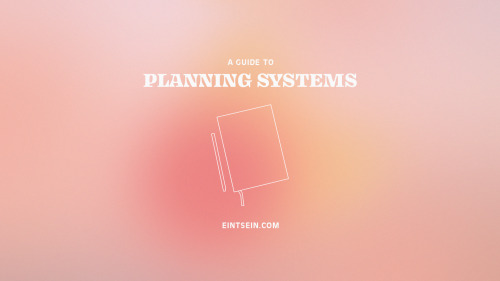
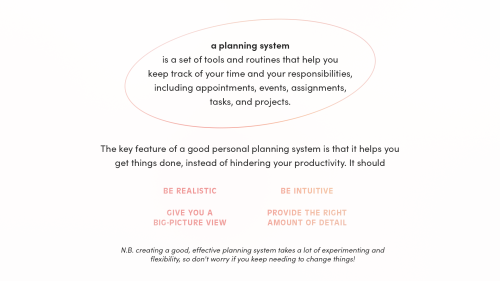
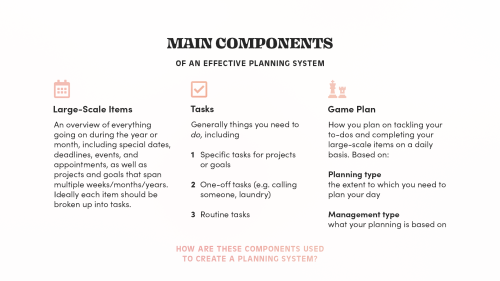
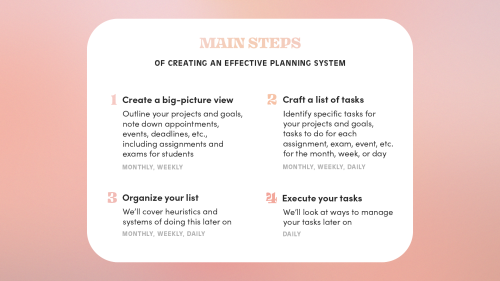
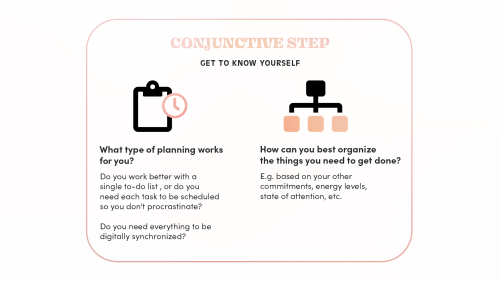
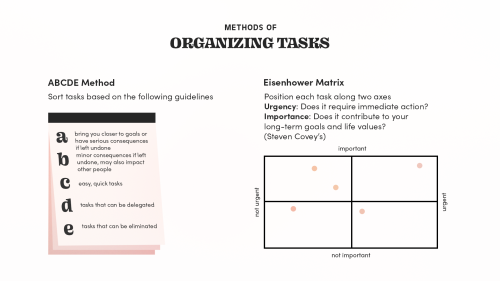
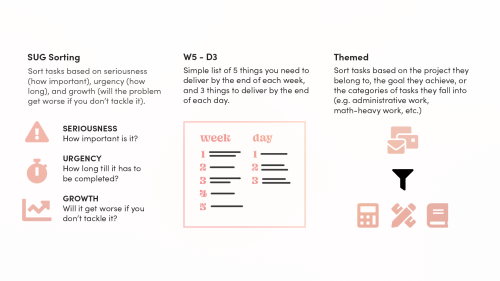
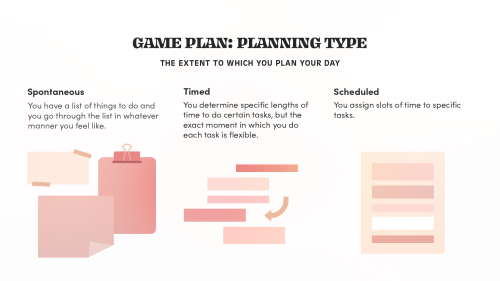
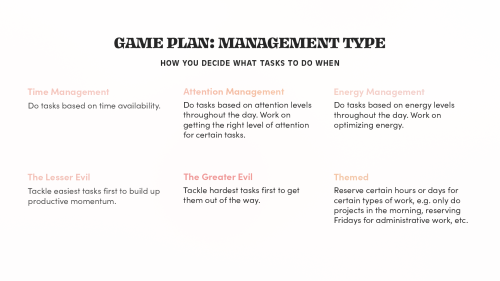
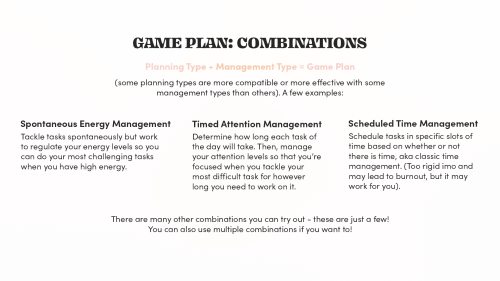
A Guide to Planning Systems
It’s important to have a system of getting things done, whether it’s tackling tasks as the day progresses or having a carefully planned schedule for every single hour of the week. How can you create an effective personal planning system that suits your needs and preferences?
Mentioned in this post:
Attention Management: How to Take Control and Live Intentionally
Energy Management: A Human-Based Organization Method
Flexible Time-Blocking: A More Breathable Way to Get Things Done
The ABCDE Method: Accomplish Tasks More Efficiently
My other posts
N.B. some categories include a few examples but they are no means limited to the ones listed here, e.g. there may be methods of organizing tasks other than the five listed here.
Stay Energized in the Winter!

I live in Ithaca now, and at this time of year, the sun’s up for like 8-9 hours a day, and it’s cold and dark, and you often find yourself not wanting to do anything. However, I still need to keep up with my studies, and I’m sure some of you are faced with a similar problem. So, I’ve gathered some of the things I do to help me stay energized throughout a winter day.
Understand your energy levels and work with them
I don’t think it’s reasonable to expect yourself to be able to do as much work or be as energized in the colder months as you do in warmer months.
For example, maybe in the summer/fall, you could survive with 5 hours of sleep and more intense work sessions, but in the winter, you might need more breaks and more sleep, and trying to resist that might result in the further deterioration of your energy levels. If you don’t already, try taking a midday break.
You shouldn’t feel guilty for having to recharge. You’ll be more productive afterwards.
Get enough sunlight
Exposure to sunlight boosts your mood by increasing your body’s serotonin levels - one of the happy hormones. It makes you more alert, energized, and prevents you from getting Seasonal Affective Disorder (SAD).
My advice is to spend as much daylight time doing things so you can do them the most productively. Even if you’re more inclined to do things later in the day, at least push forward some of the things on your daily routine, or rearrange them in such a way that you get as much sunlight possible.
This semester - unfittingly called the ‘spring’ semester - I tried to schedule my classes as early as possible, even though I generally get sluggish in the afternoon and then work better in the evening. This is because I want to have time to do my work - or at least be out - while the sun’s still up.
Exercise where you can
It’s so hard to exercise outdoors in this weather, but I still see people going for jogs around campus, or hitting the gym. Personally, I just do some stretching and light exercise in my room.
Alternatively, if you take the bus, get off a stop early then walk the rest of the way (unless there’s terrible weather like a snowstorm or something where being outside is harmful). The key thing is that you get yourself moving, especially in the morning - you’ll be more productive and happier throughout the day.
Shower
I know the winter’s cold and you don’t feel like you have to take a shower, especially since it can make your skin dry. However, it’s a great energy booster, especially in the morning. Showering in the morning improves your blood flow and alertness, and reduces your stress levels throughout the day. If you don’t have time in the morning, shower in the evening, so you’ll have more energy after the sun goes down..
Make plans or have something to look forward to
Nothing is more draining than knowing that you have nothing to do, nothing to look forward to. You’ll probably just end up in your bed watching Netflix all day, which, let’s face it, might be fun at first but turns out to be a hell of an energy drainer. Go out to eat, study with someone, or at least watch something together.
Indulge yourself
Curl up with a good book. Watch your favorite show. Play some tunes while you sketch your favorite characters or OCs. It’s the winter, you deserve a little break to recover. If you don’t relax every now and then, you won’t be able to work as intensely and focus as hard as you want or need to.
Also, although it’s great to eat healthy, but a cup of hot cocoa or a muffin once in a while is fine and makes you happier in that moment.
Work on an indoor hobby
You’re going to spend a lot of time indoors, might as well use that time usefully (aside from schoolwork or other obligations). I like doing creative things like digital art, journaling, or bullet journaling while listening to a podcast, or reading - these types of activities are the most energizing for me.
You don’t need to do the things I listed - the point is, you should use your time indoors wisely, since during other parts of the year, you’ll probably be out a lot more.
Listen to the right music
I don’t know what y’all listen to but music is an awesome energy booster if you can align it with how you’re feeling. You know how sometimes you listen to a certain type of music and your mind just feels like it’s hovering there, like it’s slightly repelled by the music but you also don’t really hate it, and you just end up feeling unfulfilled afterwards? (That was a trash explanation but I hope you understand what I mean.) Yeah don’t do that.
During the day, listen to music that keeps you awake and energized - it could be hard hitting rock or dance-y pop or maybe even something mellow. Whatever it is, don’t try to counter it. I like to listen to roaring guitars in the morning, and slow jazz in the evening, and that works for me.
Get enough sleep (‘enough’ might be more than you usually get)
During the winter, you can take advantage of the cold and cozy weather to get more sleep. I know it’s tempting to keep working until you finish all your tasks, but if it means sacrificing your sleep, you’ll only end up depriving yourself of your already low levels of energy. Also, make sure you get good quality sleep so that you’ll be as energized as possible the next morning.
However, don’t get too much sleep. This morning, I came into math class, and my friend was like ‘you look really tired today, is something wrong?’ and no, there was nothing wrong. It’s just that this morning, I chose to sleep in until 8 when I usually wake up at 7, meaning I slept more than I should have. Too much sleep just makes you feel groggy once you wake up.
During the day, take a power nap if you have to, but don’t extend it for too long that your sleep inertia kicks in and you can’t get up anymore.
Focus on your food
I think the food we eat - and how we eat it - is a huge factor in maintaining our energy levels during these cold, dark months. So here’s an entire section about food-related strategies to combat the winter blues.
1. Eat well
Winter might tempt you to eat bulky food and sweets, but they’re not that beneficial to your productivity and energy levels. Sugary foods actually cause you to be sleepy during the day and reduce the quality of your sleep at night. Instead, opt to eat foods that contain
Vitamin C - like in fruits and vegetables - to boost your energy levels; and
Vitamin B12 - like fish, milk, and eggs - to reduce fatigue
2. Have good eating habits (don’t skip breakfast!)
In college especially, a lot of people skip breakfast - and sometimes even lunch - only to overeat during dinnertime. However, having a good breakfast - especially one with protein, fiber, and whole grains - will increase your ability to focus and boost your productivity throughout the day. Maybe you’re the type of person who tends to skip breakfast - the winter’s a great time to pick up the habit of having a morning meal. Recently, I’ve been having peanut butter and acai overnight oats - nutritious and convenient.
3. Have caffeine at the right time (if you consume any)
Studies show that the most effective time to have caffeine is between 9:30 to 11:30 am. Even if you have breakfast before that, I recommend waiting a little while before you sip your cup of coffee or whatever source of caffeine you take. You can always bring a cup to class or wherever you’re headed to at that time.
In the evening, I recommend having a cup of tea. Some teas contain enough caffeine to keep you alert but not prevent you from sleeping at night. My favorite is green tea, but other teas like oolong or black tea work just as well.
4. Snack (a little)
But not too much. A single square of chocolate or a couple crackers are great mood boosters, and it even improves cognitive functioning. You could even have a cup of tea along with your snack, which is doubly energizing.

That’s all I have for you now. Feel free to drop an ask or message me if you have any questions, and I hope the rest of the winter goes great for you!
p.s. wml bc I heard the winters here last till April


Source
-
 gremlinplaguedoc liked this · 2 years ago
gremlinplaguedoc liked this · 2 years ago -
 the-cormorant reblogged this · 2 years ago
the-cormorant reblogged this · 2 years ago -
 acridotheres liked this · 2 years ago
acridotheres liked this · 2 years ago -
 booksflowersmoonwings liked this · 2 years ago
booksflowersmoonwings liked this · 2 years ago -
 flyingbooks42 liked this · 2 years ago
flyingbooks42 liked this · 2 years ago -
 crowleys-angels liked this · 2 years ago
crowleys-angels liked this · 2 years ago -
 waltersbelieveitornotemporium liked this · 2 years ago
waltersbelieveitornotemporium liked this · 2 years ago -
 el-the-cell liked this · 2 years ago
el-the-cell liked this · 2 years ago -
 einsteinspencil reblogged this · 2 years ago
einsteinspencil reblogged this · 2 years ago -
 anjalis-ennui liked this · 2 years ago
anjalis-ennui liked this · 2 years ago -
 jumpingthesefences reblogged this · 2 years ago
jumpingthesefences reblogged this · 2 years ago -
 lifune liked this · 2 years ago
lifune liked this · 2 years ago -
 fuserofworlds reblogged this · 2 years ago
fuserofworlds reblogged this · 2 years ago -
 jumpingthesefences liked this · 2 years ago
jumpingthesefences liked this · 2 years ago -
 structuredreality liked this · 2 years ago
structuredreality liked this · 2 years ago -
 crisssemm liked this · 2 years ago
crisssemm liked this · 2 years ago -
 futuretitan liked this · 2 years ago
futuretitan liked this · 2 years ago -
 thisismystudylife liked this · 2 years ago
thisismystudylife liked this · 2 years ago -
 beginningofourend reblogged this · 2 years ago
beginningofourend reblogged this · 2 years ago -
 beginningofourend liked this · 2 years ago
beginningofourend liked this · 2 years ago -
 eradix liked this · 2 years ago
eradix liked this · 2 years ago -
 studying-alex liked this · 2 years ago
studying-alex liked this · 2 years ago -
 spiritofcamelot reblogged this · 2 years ago
spiritofcamelot reblogged this · 2 years ago -
 spiritofcamelot liked this · 2 years ago
spiritofcamelot liked this · 2 years ago -
 lizzysfuckindead liked this · 2 years ago
lizzysfuckindead liked this · 2 years ago -
 highcaliper liked this · 2 years ago
highcaliper liked this · 2 years ago -
 the-unabridged-journals reblogged this · 2 years ago
the-unabridged-journals reblogged this · 2 years ago -
 hikari1996 liked this · 2 years ago
hikari1996 liked this · 2 years ago -
 wkkssilva reblogged this · 2 years ago
wkkssilva reblogged this · 2 years ago -
 theravenclawstudent reblogged this · 2 years ago
theravenclawstudent reblogged this · 2 years ago -
 foolishtrashman liked this · 2 years ago
foolishtrashman liked this · 2 years ago -
 stonybnatural liked this · 2 years ago
stonybnatural liked this · 2 years ago -
 pions reblogged this · 2 years ago
pions reblogged this · 2 years ago -
 stellarmuffin liked this · 2 years ago
stellarmuffin liked this · 2 years ago -
 a-very-smooth-boltzmann-brain liked this · 2 years ago
a-very-smooth-boltzmann-brain liked this · 2 years ago -
 perrydeplatypus liked this · 2 years ago
perrydeplatypus liked this · 2 years ago -
 soybeansoybean liked this · 2 years ago
soybeansoybean liked this · 2 years ago -
 athomeamongtheheather liked this · 3 years ago
athomeamongtheheather liked this · 3 years ago -
 wanderinginthecosmos liked this · 3 years ago
wanderinginthecosmos liked this · 3 years ago -
 kiwi-collideoscope reblogged this · 3 years ago
kiwi-collideoscope reblogged this · 3 years ago -
 feathernightmoon liked this · 3 years ago
feathernightmoon liked this · 3 years ago -
 prettylilleo liked this · 3 years ago
prettylilleo liked this · 3 years ago













